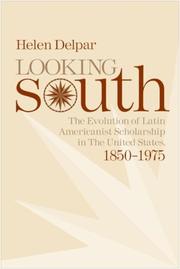| Listing 1 - 4 of 4 |
Sort by
|

ISBN: 0817380124 9780817380120 9780817315948 0817315942 9780817354640 0817354646 Year: 2008 Publisher: Tuscaloosa University of Alabama Press
Abstract | Keywords | Export | Availability | Bookmark
 Loading...
Loading...Choose an application
- Reference Manager
- EndNote
- RefWorks (Direct export to RefWorks)
In the Preface to her new study, Latin Americanist Helen Delpar writes, ""Since the seventeenth century, Americans have turned their gaze toward the lands to the south, seeing in them fields for religious proselytization, economic enterprise, and military conquest."" Delpar, consequently, aims her considerable gaze back at those Americans and the story behind their longtime fascination with Latin American culture. By visiting seminal works and the cultures from which they emerged, following the effects of changes in scholarly norms and political developments on the training of students, and ev
Latin Americanists --- Latin American studies specialists --- Hispanists --- Latin America --- Asociación Latinoamericana de Libre Comercio countries --- Neotropical region --- Neotropics --- New World tropics --- Spanish America --- Historiography. --- Study and teaching

ISBN: 0822327260 0822327244 9786612903526 1282903527 0822380595 9780822380597 Year: 2001 Publisher: Durham, NC : Duke University Press,
Abstract | Keywords | Export | Availability | Bookmark
 Loading...
Loading...Choose an application
- Reference Manager
- EndNote
- RefWorks (Direct export to RefWorks)
The conditions for thinking about Latin America as a regional unit in transnational academic discourse have shifted over the past decades. In The Exhaustion of Difference Alberto Moreiras ponders the ramifications of this shift and draws on deconstruction, Marxian theory, philosophy, political economy, subaltern studies, literary criticism, and postcolonial studies to interrogate the minimal conditions for an effective critique of knowledge given the recent transformations of the contemporary world. What, asks Moreiras, is the function of critical reason in the present moment? What is regionalistic knowledge in the face of globalization? Can regionalistic knowledge be an effective tool for a critique of contemporary reason? What is the specificity of Latin Americanist reflection and how is it situated to deal with these questions? Through examinations of critical regionalism, restitutional excess, the historical genealogy of Latin American subalternism, testimonio literature, and the cultural politics of magical realism, Moreiras argues that while cultural studies is increasingly institutionalized and in danger of reproducing the dominant ideologies of late capitalism, it is also ripe for giving way to projects of theoretical reformulation. Ultimately, he claims, critical reason must abandon its allegiance to aesthetic-historicist projects and the destructive binaries upon which all cultural theories of modernity have been constructed. The Exhaustion of Difference makes a significant contribution to the rethinking of Latin American cultural studies. --
Latin American literature --- Littérature latino-américaine --- Study and teaching (Higher) --- Enseignement supérieur --- Latin America --- Amérique latine --- Civilization --- Civilisation --- Criticism (Philosophy) --- Latin Americanists --- Criticism (Philosophy). --- Study and teaching (Higher). --- Littérature latino-américaine --- Enseignement supérieur --- Amérique latine --- Philosophy --- Latin American studies specialists --- Hispanists --- Asociación Latinoamericana de Libre Comercio countries --- Neotropical region --- Neotropics --- New World tropics --- Spanish America
Book
ISBN: 2858024755 2858024758 2371540781 2296327834 Year: 2018 Volume: 37 Publisher: Paris : Éditions de l’IHEAL,
Abstract | Keywords | Export | Availability | Bookmark
 Loading...
Loading...Choose an application
- Reference Manager
- EndNote
- RefWorks (Direct export to RefWorks)
Comment peut-on être latino-américaniste aujourd’hui ? Quel intérêt représente pour les sciences de l’homme et de la société, l’existence d’une corporation de chercheurs spécialistes d’une aire culturelle, l’Amérique latine ? Comment évoluent les connaissances scientifiques concernant le continent ? Comment ces connaissances sont-elles transmises et à quel public ? C’est à ces questions et à quelques autres que Jacques Chonchol et Guy Martinière s’efforcent de répondre dans cet ouvrage. Découverte par l’Europe, colonisée, l’Amérique a d’abord été connue grâce aux récits des navigateurs et des missionnaires. Au XIXe siècle, les explorateurs ont laissé la place aux premiers universitaires et chercheurs. Géographes, ethnologues, historiens, archéologues... exprimèrent les ambitions d’une science et d’un esprit scientifique universels appliqués aux caractéristiques originales de ce laboratoire : le latino-américanisme était né. Il était né en France. Mais, l’expression même de ce latino-américanisme apparaissait bien différente selon les visions, perceptions et problématiques fort diverses dont il se réclamait. À mesure que l’intérêt des acteurs du développement des relations entre l’Amérique latine et la France s’accentuait, les cheminements culturels, économiques, politiques des peuples et des nations se diversifiaient. Les latino-américanistes peuvent-ils encore faire connaître aujourd’hui l’Amérique latine aux Latino-américains ? Ont-ils seulement la possibilité, en France, de faire connaître l’Amérique latine aux Français ?
Latin Americanists --- France --- Latin America --- Amérique latine --- Relations --- Research --- History --- Study and teaching (Higher) --- History. --- Latin American studies specialists --- Hispanists --- Asociación Latinoamericana de Libre Comercio countries --- Neotropical region --- Neotropics --- New World tropics --- Spanish America --- Bro-C'hall --- Fa-kuo --- Fa-lan-hsi --- Faguo --- Falanxi --- Falanxi Gongheguo --- Faransā --- Farānsah --- França --- Francia (Republic) --- Francija --- Francja --- Francland --- Francuska --- Franis --- Franḳraykh --- Frankreich --- Frankrig --- Frankrijk --- Frankrike --- Frankryk --- Fransa --- Fransa Respublikası --- Franse --- Franse Republiek --- Frant︠s︡ --- Frant︠s︡ Uls --- Frant︠s︡ii︠a︡ --- Frantsuzskai︠a︡ Rėspublika --- Frantsyi︠a︡ --- Franza --- French Republic --- Frencisc Cynewīse --- Frenska republika --- Furansu --- Furansu Kyōwakoku --- Gallia --- Gallia (Republic) --- Gallikē Dēmokratia --- Hyãsia --- Parancis --- Peurancih --- Phransiya --- Pransiya --- Pransya --- Prantsusmaa --- Pʻŭrangsŭ --- Ranska --- República Francesa --- Republica Franzesa --- Republika Francuska --- Republiḳah ha-Tsarfatit --- Republikang Pranses --- République française --- Tsarfat --- Tsorfat --- Γαλλική Δημοκρατία --- Γαλλία --- Франц --- Франц Улс --- Французская Рэспубліка --- Францыя --- Франция --- Френска република --- פראנקרייך --- צרפת --- רפובליקה הצרפתית --- فرانسه --- فرنسا --- フランス --- フランス共和国 --- 法国 --- 法蘭西 --- 法蘭西共和國 --- 프랑스 --- France (Provisional government, 1944-1946) --- relations France - Amérique latine --- relations extérieures --- Amérique latine (civilisation) --- influences latino-américaines

ISBN: 0521373034 0521063957 0511983980 Year: 1990 Publisher: Cambridge : Cambridge University Press,
Abstract | Keywords | Export | Availability | Bookmark
 Loading...
Loading...Choose an application
- Reference Manager
- EndNote
- RefWorks (Direct export to RefWorks)
Latin America through Soviet Eyes provides an original and comprehensive assessment of changing Soviet perceptions of politics in Latin America during the Brezhnev years. Dr Prizel surveys the views of Soviet academics and journalists as well as of politicians on three main areas. He explores the changing Soviet perceptions of Latin America's domestic politics including the Church, the military and national liberation movements; he examines the role of Latin America in global politics and the way in which the USA has influenced regional events, and he discusses the emerging Soviet-Latin American relationship. Case studies of Mexico, Chile, Brazil and Argentina provide a framework for understanding changing Soviet perceptions in the context of the domestic dynamics of specific individual countries. This book is based on a wealth of Russian, Spanish and English language sources. Soviet academic journals, newspapers, communist party journals and the numerous books published by the Institute of Latin America of the Academy of Sciences in the USSR provide the Soviet view of Latin America and this is examined against a background of regional perceptions expressed in Spanish-American material.
Latin America --- Foreign public opinion [Russian ] --- History --- 20th century --- Public opinion --- Soviet Union --- Latin Americanists --- Attitude --- Scholars --- Journalists --- Politicians --- Relations --- Social Sciences --- Political Science --- History. --- Attitudes. --- Foreign public opinion, Soviet --- Statesmen --- Columnists --- Commentators --- Authors --- Persons --- Learning and scholarship --- Latin American studies specialists --- Hispanists --- Opinion, Public --- Perception, Public --- Popular opinion --- Public perception --- Public perceptions --- Judgment --- Social psychology --- Attitude (Psychology) --- Focus groups --- Reputation --- Asociación Latinoamericana de Libre Comercio countries --- Neotropical region --- Neotropics --- New World tropics --- Spanish America --- Советский Союз --- Ber. ha-M. --- Związek Socjalistycznych Republik Radzieckich --- ZSRR --- Związek Socjalistycznych Republik Sowieckich --- ZSRS --- Szovjetunió --- TSRS --- Tarybų Socialistinių Respublikų Sąjunga --- SRSR --- Soi︠u︡z Radi︠a︡nsʹkykh Sot︠s︡ialistychnykh Respublik --- SSSR --- Soi︠u︡z Sovetskikh Sot︠s︡ialisticheskikh Respublik --- UdSSR --- Shūravī --- Ittiḥād-i Jamāhīr-i Ishtirākīyah-i Shūrāʼīyah --- Russia (1923- U.S.S.R.) --- Sovetskiy Soyuz --- Soyuz SSR --- Sovetskiĭ Soi︠u︡z --- Soi︠u︡z SSR --- Uni Sovjet --- Union of Soviet Socialist Republics --- USSR --- SSṚM --- Sovetakan Sotsʻialistakan Ṛespublikaneri Miutʻyun --- SSHM --- Sovetakan Sotsʻialistakan Hanrapetutʻyunneri Miutʻyun --- URSS --- Unión de Repúblicas Socialistas Soviéticas --- Berit ha-Moʻatsot --- Rusyah --- Ittiḥād al-Sūfiyītī --- Rusiyah --- Rusland --- Soṿet-Rusland --- Uni Soviet --- Union soviétique --- Zȯvlȯlt Kholboot Uls --- Związek Radziecki --- ESSD --- Sahaphāp Sōwīat --- KhSHM --- SSR Kavširi --- Russland --- SNTL --- PSRS --- Su-lien --- Sobhieṭ Ẏuniẏana --- FSSR --- Unione Sovietica --- Ittiḥād-i Shūravī --- Soviyat Yūniyan --- Russian S.F.S.R.
| Listing 1 - 4 of 4 |
Sort by
|

 Search
Search Feedback
Feedback About UniCat
About UniCat  Help
Help News
News